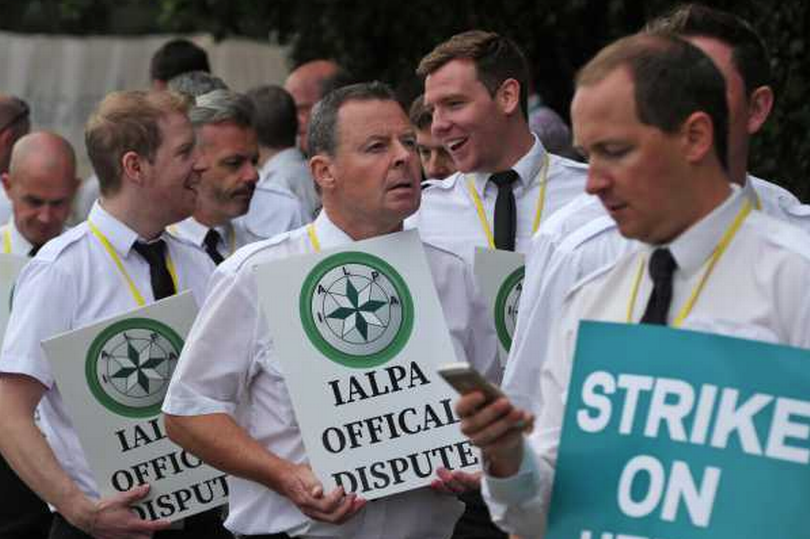Ryanair Pilots Across Europe go on Strike Seeking Better Working Conditions

Employees of Europe’s second largest airline, Ryanair, went on strike on Friday, leading to the grounding of 400 of the company’s 2,400 flights. Pilots from Ireland, Germany, Belgium, Sweden and the Netherlands took part in the 24-hour strike. This is one of the largest in a series of industrial actions carried out by employees’ unions to press for their demands regarding pay, and the type of labor contract.
Negotiations between the unions and the airline have been going on since the beginning of this year after the company, threatened with strikes during Christmas, recognized the workers’ unions in December 2017 after refusing to do so for 33 years. However, no further progress was made in achieving an agreement.
Based in Ireland, Ryanair is the largest low-cost airline in Europe. The company has been able to offer tickets at cheap prices by exploiting its pilots, who earn less than their counterparts in other airlines. While the company has agreed offered a pay raise, the unions have been unwilling to settle the dispute without their demands over the labor contract being addressed.
Ryanair has 14,500 workers, hired from and based in different countries across Europe. The company has hired all of its workforce in accordance with Irish employment law, which is mostly biased in favor of employers over employees, making it easier for the former to hire and fire, and difficult for the latter to legally challenge the employers.
One of the key demands of unions is that workers should be hired according to the labor law in the country in which they are based. The company has ruled out accepting this demand on the grounds that it is registered in Ireland, which makes it an Irish company which should be hiring in accordance with that country’s employment laws.
The unions have countered this argument by pointing out that the company has bases and workers across the continent, which makes it a European airline, whose real reason for choosing the Irish labor contract is that it allows more scope for workers to be exploited.
This was also admitted by the company in its 2018 annual report, which states: “Ryanair crew with the exception of those based in the UK, operate on Irish contracts of employment. That model has been challenged in the past by individuals and may continue to be challenged by trade unions who often favor local employment contracts. If local contracts were imposed, it could impact on costs, productivity and complexity of the business.”
The additional costs that adopting local employment contracts will impose on the airline, which is expected to reap of profit of 1.25 billion euros this year, can be illustrated by comparing the Irish employment law with that of Spain.
The Spanish Workers’ Statute Law stipulates that the maximum number of working hours per week should be 40 with a nine-hour work day. The law also mandates that those under the age of 18 should not be forced to work for more than eight hours a day.
Further, the law also guarantees workers 15 days of paid leave in case of marriage, two days of paid leave for a working husband when his wife gives birth to a child, one hour of daily paid absence to a working mother for breastfeeding her newborn until the child reaches the age of nine months and two days of paid leave in case a relative sustains a serious injury or illness requires his or her presence. However, a Spanish citizen, working in Spain for Ryanair, is not entitled to these provisions that are not provided under Irish law.
“After a year of negotiations, the failure of Ryanair to.. apply Spanish labor legislation for the pilots who operate in Spain forces the union to take a legal path to attain this objective,” the Spanish Pilots Union SEPLA – which counts among its members 500-800 Ryanair pilots – said on Friday last week, announcing its decision to sue the airline in Spain’s High Court.
“Sue. Off you go, get on with it.. You’ll lose,” was the response of Ryanair Chief Executive Michael O’Leary. His confidence might be exaggerated because only last month, a court in the Netherlands ruled that Dutch labor law should apply to all Ryanair employees based in the country, after hearing a case filed by an employee who was dismissed by the airline for refusing a transfer to Dublin from Eindhoven.
A ‘wake up call’ for the airline
Having seen 600 of its flights grounded last month as cockpit and cabin crew members in Belgium, Ireland, Italy, Portugal and Spain struck work, the airline, determined to disrupt coordinated simultaneous action this time, had approached the Haarlem district court in the Netherlands, seeking an urgent order against Dutch pilots’ participation in the protest. The court, however, ruled in favor of the union and declared that, “The strike may go ahead”.
Vereninging Nederlandse Verkeerscliegers (VNV), a trade union of Dutch civil aviation pilots, supported the strike after 99.5% of its members voted in favor. In a statement announcing its support for the action, VNV said: “The VNV has done everything it can to get out of the negotiating table in recent weeks. The feeling that Ryanair does not want to reach an agreement with its Dutch pilots is growing by the day.. Ryanair seems to need a ‘wake up call’ that ignoring its pilots is no longer tenable, perhaps organizing a strike is the only way to achieve this goal.” Apart from application of Dutch labor law to the employees based in Netherlands, the union has also demanded “payments in case of illness and improvement of the pension plan”.
The airline had announced that “there will be no cancellations as a result of the unnecessary strike action by the Dutch pilot union”. Nonetheless, around 22 flights were grounded on Friday at Eindhoven airport. The biggest disruption, however, was in Germany, where following a call by the union,Vereinigung Cockpit, about 480 pilots of Ryanair in the country went on strike for 24 hours – from 3:01 am of August 10 to 2:59 am on the 11th – bringing about 250 flights to halt in ten airports. The decision to support the industrial action was taken on July 30, after 96% of the union members voted in favor.
“To avoid industrial action”, the chairman of Industrial Relations of Vereinigung Cockpit, Ingolf Schumacher, had said, “We are offering Ryanair a final deadline to submit a workable proposal by August 6, 2018. Unfortunately, so far, Ryanair has not made any proposal with which we could work. Last Friday, another round of exploratory talks yielded no progress either.. Since the start of our negotiations in January, Ryanair has been playing for time and.. if Ryanair is not taking this ballot seriously, industrial action like in other European countries, seems unavoidable in Germany as well. “
While Ryanair, on one hand, has called upon the unions to continue negotiations instead of persisting with the strike action, chief executive O’Leary has threatened to shift jobs to other countries if the unions refuse to accept the company’s terms. The mooted plan of shifting a part of its fleet in Dublin to Poland, if executed, can lead to 300 employees losing their jobs.
Condemning the company’s attempt to play workers in different countries against each other, the Deputy Secretary General of European Trade Union Confederation, Peter Scherrer, lauded the coordination of employees across the borders, and said the unity of workers in different countries that was demonstrated in the strike “sends a signal to other companies where workers are played off against each other.”
The World Federation of Trade Unions, consisting 92 million workers from 126 countries, expressed its solidarity with the strike, saying, “As the world’s militant trade union movement, we stand by the side of the workers of Ryanair and we are ready to support their struggles for the improvement of their working conditions and the respect of their rights.”
Get the latest reports & analysis with people's perspective on Protests, movements & deep analytical videos, discussions of the current affairs in your Telegram app. Subscribe to NewsClick's Telegram channel & get Real-Time updates on stories, as they get published on our website.















